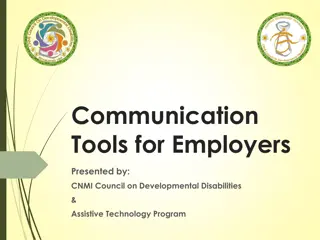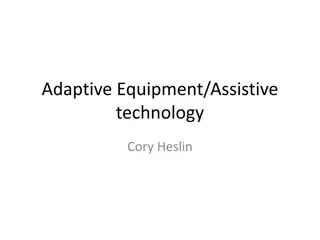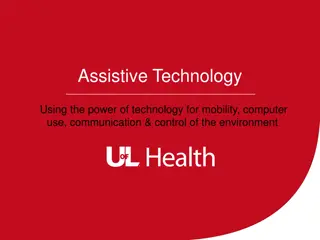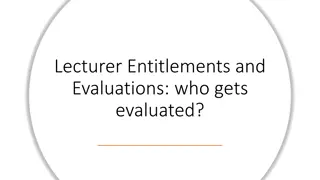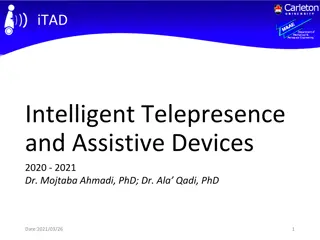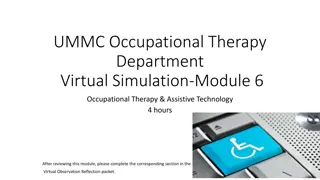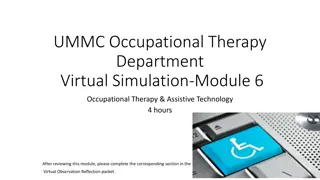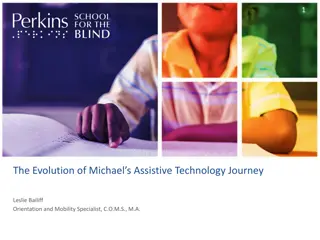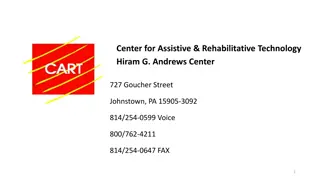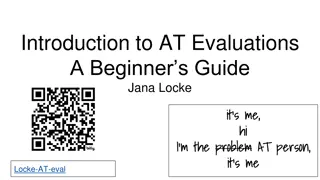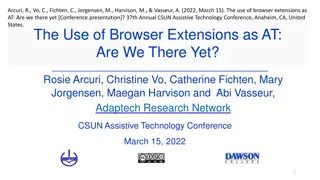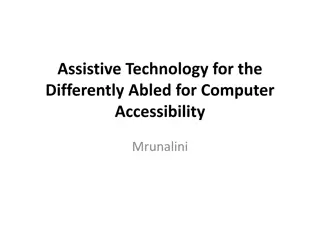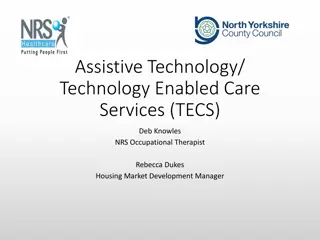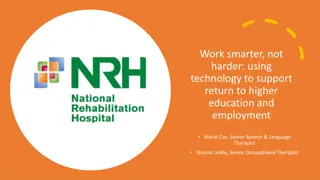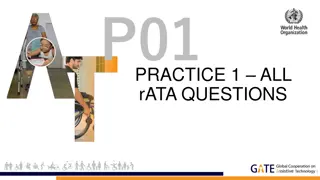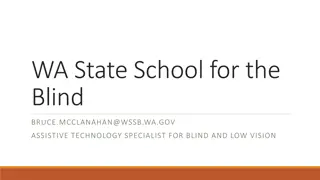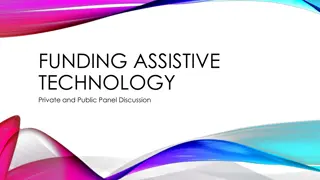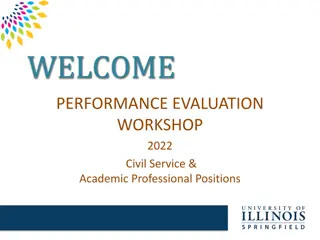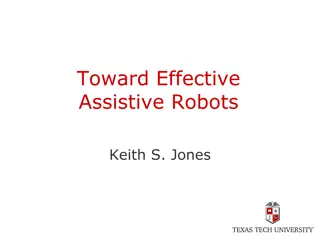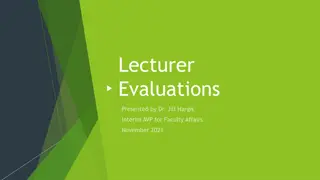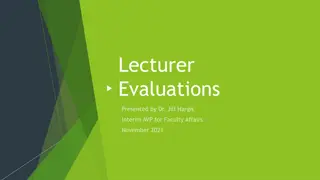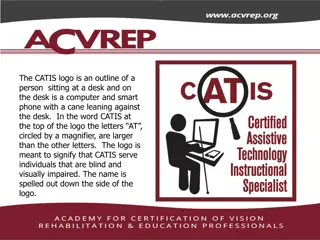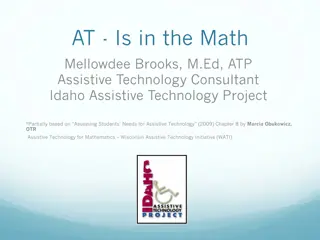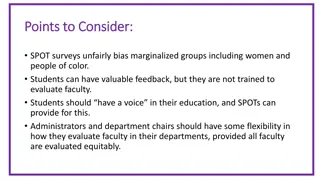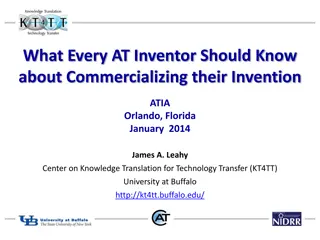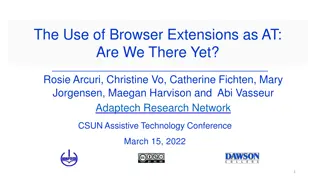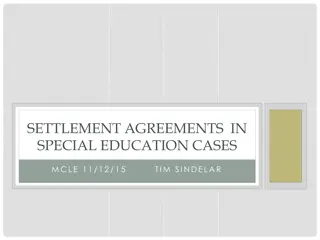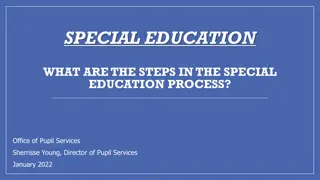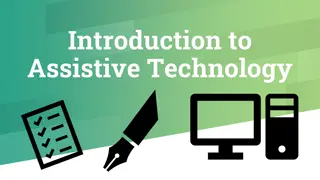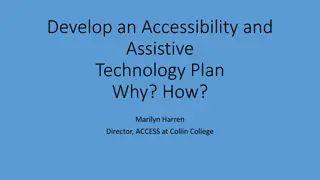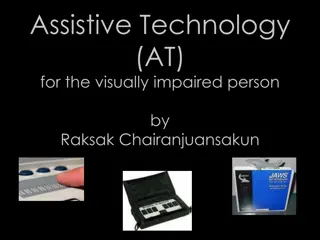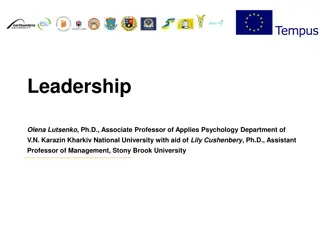Latest Trends in Transition and Workplace Accessibility for 2024
Explore the new developments and solutions in transition and workplace accessibility for 2024, including discussions on emerging trends, scenarios featuring assistive technology options, current issues, and sessions on enhancing employability skills. The ATIA 2024 Conference features expert speakers
4 views • 19 slides
Effective Communication Strategies for Employers
Discover communication tools and assistive technology to enhance interactions with individuals with disabilities. Engage in activities to improve communication skills and learn about assistive technology categories. Gain insights on areas where assistive technology can be applied and access practica
1 views • 9 slides
Understanding Adaptive Equipment and Assistive Technology for Home Adaptations
Explore the differences between Adaptive Equipment (AE) and Assistive Technology (AT), such as how AE aids in completing functional tasks while AT helps increase independence. Discover examples like Text-to-Speech for dyslexia, Word Prediction for learning disabilities, and Environmental Controls fo
2 views • 29 slides
Enhancing Lives with Assistive Technology
Assistive Technology empowers individuals with disabilities by providing tools and solutions for mobility, communication, and daily tasks. This technology, defined as items or systems that improve functional capabilities, helps redefine disability, increase resilience, and enable individuals to enga
1 views • 27 slides
Guidelines for Lecturer Evaluations and Entitlements at CPP
This document outlines the evaluation process for lecturers at CPP, including annual and cumulative evaluations, who needs to be evaluated, the importance of cumulative evaluations, and the time periods covered by evaluations. It explains the criteria for evaluations, ensuring fair assessment and pr
1 views • 10 slides
Advancements in iTAD: Intelligent Telepresence and Assistive Devices 2020-2021
The iTAD project presents significant achievements in the development of assistive technologies, including Mobile Manipulator, Versatile Assistive Roaming System, and Remote Assessment of High-Risk Patients. Key accomplishments include patient interaction research, drivetrain and frame design, elect
0 views • 19 slides
Army Leadership Doctrine Update: ADP 6-22.1 Highlights
New Army Doctrine Publication (ADP) 6-22.1, "Army Leadership and the Profession," emphasizes the foundational principles of leadership with updated content and guidance. It covers essential leadership traits, values, competencies, and behaviors, providing insights into effective leadership practices
1 views • 6 slides
Explore Assistive Technology in Occupational Therapy
Delve into the world of assistive technology within the occupational therapy domain through a virtual simulation module, video case studies, and a TED Talk. Reflect on Sheena's case, the impact of adaptive equipment, and your interest in this OT area. Discover apps for medication reminders and visua
0 views • 4 slides
Assistive Technology in Occupational Therapy: Case Review & TED Talk Analysis
Explore the intersection of occupational therapy and assistive technology through a virtual simulation module focusing on Sheena's case and a TED Talk on accessible design by occupational therapists. Delve into the benefits of adaptive equipment, reflect on its relevance in OT practice, and discover
0 views • 4 slides
Michael's Assistive Technology Journey: A Story of Overcoming Challenges
Follow Michael's inspiring journey through assistive technology as he navigates life with visual impairment and other health challenges. From receiving Orientation and Mobility (O&M) services to setting goals using various assistive devices, Michael showcases resilience and determination in utilizin
0 views • 14 slides
Center for Assistive & Rehabilitative Technology at Hiram G. Andrews Center
The Center for Assistive & Rehabilitative Technology (CART) at Hiram G. Andrews Center in Johnstown, PA, has been providing assistive technology evaluations and services since 1995. CART aims to enhance the independence of individuals with severe disabilities by matching them with appropriate techno
0 views • 12 slides
Beginner's Guide to Assistive Technology Evaluations
Explore the journey of conducting Assistive Technology (AT) evaluations with valuable insights from Jana Locke, an experienced professional in education and special education. Learn about the process, considerations, and importance of collaborative decision-making in determining AT usage. Gain pract
0 views • 37 slides
Browser Extensions as Assistive Technology: Enhancing Accessibility
Explore the potential of browser extensions as assistive technology in a presentation from the 37th Annual CSUN Assistive Technology Conference. Learn how Chrome extensions can support students with disabilities, providing safe downloads, alternative AT options, and unique functions, all while enhan
0 views • 32 slides
Enhancing Computer Accessibility for the Differently Abled with Assistive Technology
Assistive technology plays a crucial role in enhancing computer accessibility for differently abled individuals. It includes a range of devices and tools that enable people with disabilities to perform activities of daily living independently. These technologies not only promote greater independence
0 views • 12 slides
Understanding Assistive Technology and Technology-Enabled Care Services
This content highlights the role of Assistive Technology (AT) and Technology-Enabled Care Services (TECS) in supporting individuals, particularly those with dementia and falls. It discusses the importance of AT, the history of AT implementation in NYCC, and how Technology-Enabled Care can aid in add
0 views • 13 slides
Empowering Higher Education and Employment Through Assistive Technology at NRH
Technology plays a crucial role in supporting individuals returning to higher education and employment, as highlighted by the work done at the National Rehabilitation Hospital (NRH). The Assistive Technology Clinic at NRH provides outpatient services and vocational support, leveraging telehealth and
0 views • 15 slides
Enhancing Inclusivity: IFAD Independent Evaluations for Better Targeting
IFAD independent evaluations play a crucial role in ensuring that vulnerable groups are not left behind in rural development initiatives. By assessing the effectiveness of targeting methods, documenting instances where vulnerable groups are excluded, and providing recommendations for improvement, th
0 views • 8 slides
Lesson on rATA Practice with Case Studies and Questions
This lesson involves practicing rATA (Assistive Technology Assessment) with case studies of individuals like Nina and Arlene. Participants will analyze their needs, challenges, and potential solutions through structured questions and role-play interviews. The session covers understanding individual
0 views • 12 slides
Statewide Assistive Technology Support for Blind and Low Vision Students in Washington
Statewide Assistive Technology Program at the WA State School for the Blind aims to support all blind and low vision students in Washington through various tools and resources. They provide distance support, in-person visits, and FAQs related to JAWS, Microsoft Accessibility, and Chromebook/ChromeVo
0 views • 11 slides
Assistive Technology Funding Panel Discussion: Strategies and Resources
Explore how assistive technology can be funded through private and public resources with tips from a panel discussion. Learn about funding options such as ABLE accounts, loans, waivers, and insurance coverage. Access resources from organizations like MO HealthNet, CYSHCN program, and Missouri Assist
0 views • 5 slides
Performance Evaluation Workshop 2022 for Civil Service & Academic Positions
This workshop outlines the Performance Evaluation Cycle for the year 2022, detailing the evaluation period, form submission deadlines, and the shift towards digital evaluations. It emphasizes the importance of constructive feedback in evaluations and provides insights into the purpose of evaluations
0 views • 34 slides
Towards Effective Assistive Robots: Enhancing Elder Care with Robotics
The advancement of assistive robots is seen as a solution to the challenges faced by elder care facilities, aiming to help elders live independently in their homes. The need for assistive robots arises from space and staffing shortages in care facilities, pushing the emphasis towards in-home care so
0 views • 18 slides
Faculty Evaluations: Periods, Deadlines & Procedures
Annual and cumulative evaluations for temporary and tenured faculty are essential in the academic setting. Annual evaluations cover the past year's teaching activities while cumulative evaluations consider a longer timeframe. Deadlines and review processes are detailed in the evaluation calendar for
0 views • 12 slides
Lecturer Evaluations and Policies at Cal Poly Pomona
Annual and cumulative evaluations are conducted for lecturers at Cal Poly Pomona to review their performance over specific periods. Policy 1336 outlines the criteria for evaluations, including timelines and requirements for different categories of lecturers. The evaluations cover teaching activities
0 views • 13 slides
Certified Assistive Technology Instructional Specialists for Individuals with Visual Impairments
CATIS, Certified Assistive Technology Instructional Specialists, empower individuals who are blind or visually impaired to achieve their life goals through the use of assistive technology. They engage in vision rehabilitation, offer expertise in assessment, instruction, configuration, and exploratio
0 views • 22 slides
Understanding Language Development in Children with Assistive Technology
Explore the nuances of speech vs. language development in children, focusing on the benefits of using alternative language modes such as signs, pictures, and gestures. Delve into the definition of language and speech, set the stage for discussions around assistive technology, and learn about the imp
0 views • 40 slides
Assistive Technology in Mathematics: Enhancing Learning for Students with Disabilities
Assistive Technology (AT) offers devices and services to improve functional capabilities for students with disabilities, aiding in academic and functional performance. The SETT Framework guides the selection and use of AT, focusing on student abilities, environmental factors, tasks, and tools requir
0 views • 32 slides
Addressing Bias in Student Evaluations of Faculty: Considerations and Resolutions
SPOT surveys can unfairly bias marginalized groups in academia, such as women and people of color, impacting faculty evaluations. While student feedback is valuable, students may not be equipped to assess teaching effectively. Institutions should use SPOT data for reflection rather than consequentia
0 views • 4 slides
Assistive Technology - Enhancing Accessibility for All
Explore the benefits of assistive technology in enhancing accessibility for all individuals. Learn how these tools empower people with disabilities, the elderly, and those in need of extra support. Discover various innovative solutions and devices that cater to diverse needs, fostering inclusivity a
0 views • 9 slides
Essential Strategies for Commercializing Assistive Technology Inventions
Discover key elements and strategies to successfully commercialize assistive technology inventions, including understanding orphan vs. mainstream products, identifying licensing partners, and safeguarding ownership. Learn from the insights shared by the James A. Leahy Center on Knowledge Translation
0 views • 26 slides
Assistive Technology Solutions by VFO Group
VFO Group offers a range of assistive technology devices including the Continuous Zoom with 2x-24x Magnification with a vibrant 7-inch screen, built-in reading stand, and HDMI port; the TOPAZ PHD with a lightweight, collapsible design and choice of monitor sizes; the Traveller featuring a unique Sli
0 views • 4 slides
Exploring the Use of Browser Extensions for Assistive Technology
The presentation discusses the use of browser extensions as alternative assistive technology for students with disabilities who may prefer not to use traditional AT tools. It covers topics such as the benefits of Chrome extensions, safety tips for downloading and using them, and a curated list of re
0 views • 32 slides
Maryland Special Education Parent Involvement Survey FAQ
The Maryland Special Education Parent Involvement Survey aims to assess parental engagement with schools in supporting special education students. Parents/guardians of children aged 3 to 21 receiving special education services are required to complete the survey either online or on paper. Feedback f
0 views • 9 slides
Understanding Settlement Agreements in Special Education Cases
Delve into the complexities of settlement agreements in special education cases through the lens of the South Kingstown v. Joanna S. case in the First Circuit Court. The case revolves around disputes over independent educational evaluations, occupational therapy evaluations, and psychoeducational ev
0 views • 27 slides
Understanding the Special Education Process
Special education involves a multi-step process that includes determining eligibility, individualized education programs, referrals, evaluations, and more. The process aims to meet the unique needs of students with disabilities through specially designed instruction and services provided at no cost
0 views • 20 slides
Explore Assistive Technology for Enhanced Learning and Living
Assistive technology encompasses innovative tools that greatly benefit individuals with disabilities in various aspects of life. From enhancing learning to managing tasks and promoting wellness, assistive technology plays a vital role in improving the quality of life for people with disabilities. Di
0 views • 17 slides
Developing an Accessibility and Assistive Technology Plan for Educational Institutions
Developing an Accessibility and Assistive Technology Plan is essential for educational institutions to comply with regulations such as ADAAA, Title II, Section 504, and Section 508. This plan aids in providing equal access to students with disabilities, ensuring compliance with federal standards and
0 views • 31 slides
Assistive Technology: Advancing Accessibility for People with Disabilities
Exploring the role of assistive technology in enhancing accessibility for individuals with disabilities. Recognizing the impact of technology in creating an inclusive environment and empowering those with diverse needs. Discussing the importance of assistive tools, devices, and innovations in promot
0 views • 15 slides
Assistive Technology for Visually Impaired Individuals
Assistive Technology (AT) plays a crucial role in improving the quality of life for visually impaired individuals by providing tools such as Braille readers, JAWS software, and electronic canes. These technologies enable them to access printed materials, write, navigate, and perform daily tasks inde
0 views • 37 slides
Understanding Leadership Theories and Styles
Leadership involves influencing a group towards a common goal. Traits, interaction styles, and group dynamics play vital roles in effective leadership. Various theories, such as Trait Theories and Synthetic Leadership Theories, provide insights into different aspects of leadership. Understanding lea
0 views • 41 slides

